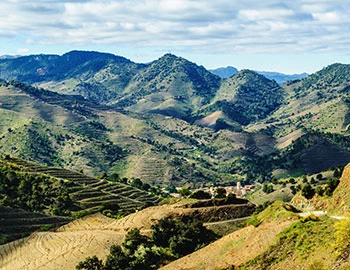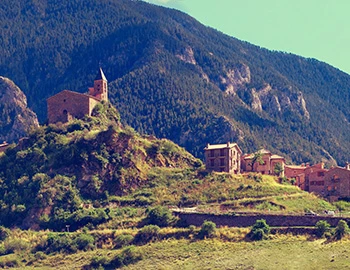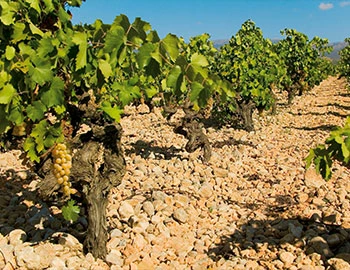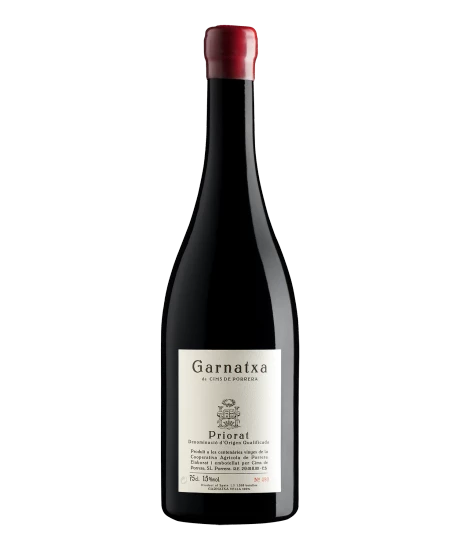Cims de Porrera Garnatxa 2015
DOC Priorat, Cooperativa de Porrera, 750 ml

Description
Dark, concentrated colour with blackish hue. On the nose, the Grenache presents the classic plum, black cherry and chocolate. On palate the liquorice tannins provide outstanding support for the structure. Well- rounded and opulent, this wine nevertheless retains plenty of freshness and balance. The finish is complex with a fine aromatic profile.
Attributes
| Grape variety: | Garnacha |
| Producer: | Cims de Porrera |
| Origin: | Spain / Catalunya / Priorato |
| Other vintages: | 2014 |
| Label: | Vegan |
| Ripening potential: | 4 to 12 years |
| Drinking temperature: | 16 to 18 °C |
| Food Pairing: | Roasted lamb gigot, Saddle of lamb fillet with herb jus, Cheese board |
| Vinification: | fermentation in wooden barrel, Pumping over |
| Harvest: | hand-picking, strict selection, in small boxes |
| Maturation: | in partly new and used barriques/ Pièces |
| Maturation duration: | 16 months |
| Volume: | 15.0 % |
| Note: | Contains sulphites |
Garnacha
Grenache seldom comes alone
Spaniards and Sardinians make the Grenache contentious: both claim it originated from their country. In fact, it had already appeared in both places by the 16th century. But a large number of mutations in Spain indicates that it has deeper roots on the Iberian Peninsula. The Grenache is meaty, rich in tannins and spicy, with a wonderful, fruity sweetness and rich aromas of blackberry, cassis, plums and pepper. Under the name Garnacha, it contributes fullness to the Rioja. In Sardinia it is called Cannonau, where it yields strong, expressive wines. But its stronghold is in France. Grenache is the star in Châteauneuf-du-Pape and streams into many other assemblages from the south. Its preferred partners are Syrah and Mourvèdre. This blend is also very popular abroad. In Australia, these wines are simply called "GSM".

Priorato
Priorat: Vergessen, wiederentdeckt, gefeiert…
Noch anfangs der 80er Jahre war das Priorat eine durch die Abwanderung geschwächte Problemregion. Dann entdeckten vier junge Winzer den verlassenen Talkessel, der nur eine Autostunde von der katalonischen Mittelmeerküste entfernt liegt, und begannen mit der Restauration der alten Rebanlagen. Heute sind die Priorat-Weine, die meistens von den alteingesessenen Sorten Garnacha und Cariñena geprägt werden, weltweit gefragt. Dank der spektakulären Renaissance der Priorat-Weine erlebt die ganze Region einen Aufschwung.

Catalunya
Catalonia: the great range
Spain’s second largest wine region has an impressive variety to offer. As a result, there are eleven different designations of origin in Catalonia. As the home of cava, Catalonia is one of the leading producers of sparkling wines produced according to classical methods. There is a wide selection of both elegant white wines and well-structured reds. Areas such as Priorat or Montsant have experienced an enormous upswing in recent years. The traditional sweet wine Moscatel de Sitges is also produced here.

Spain
Spain – Variety and perfection
“Somewhere in la Mancha, in a place whose name I do not care to remember...,” begins Don Quixote's odyssey.
The most famous part is definitely when Don Quixote thinks windmills are his enemy and wants to fight them – until they nearly kill him. It’s possible there was a bit too much of the La Mancha wine at play. Spanish vines fight for their survival in rugged landscapes, battling fierce drought and rough soils. But they fight well.



